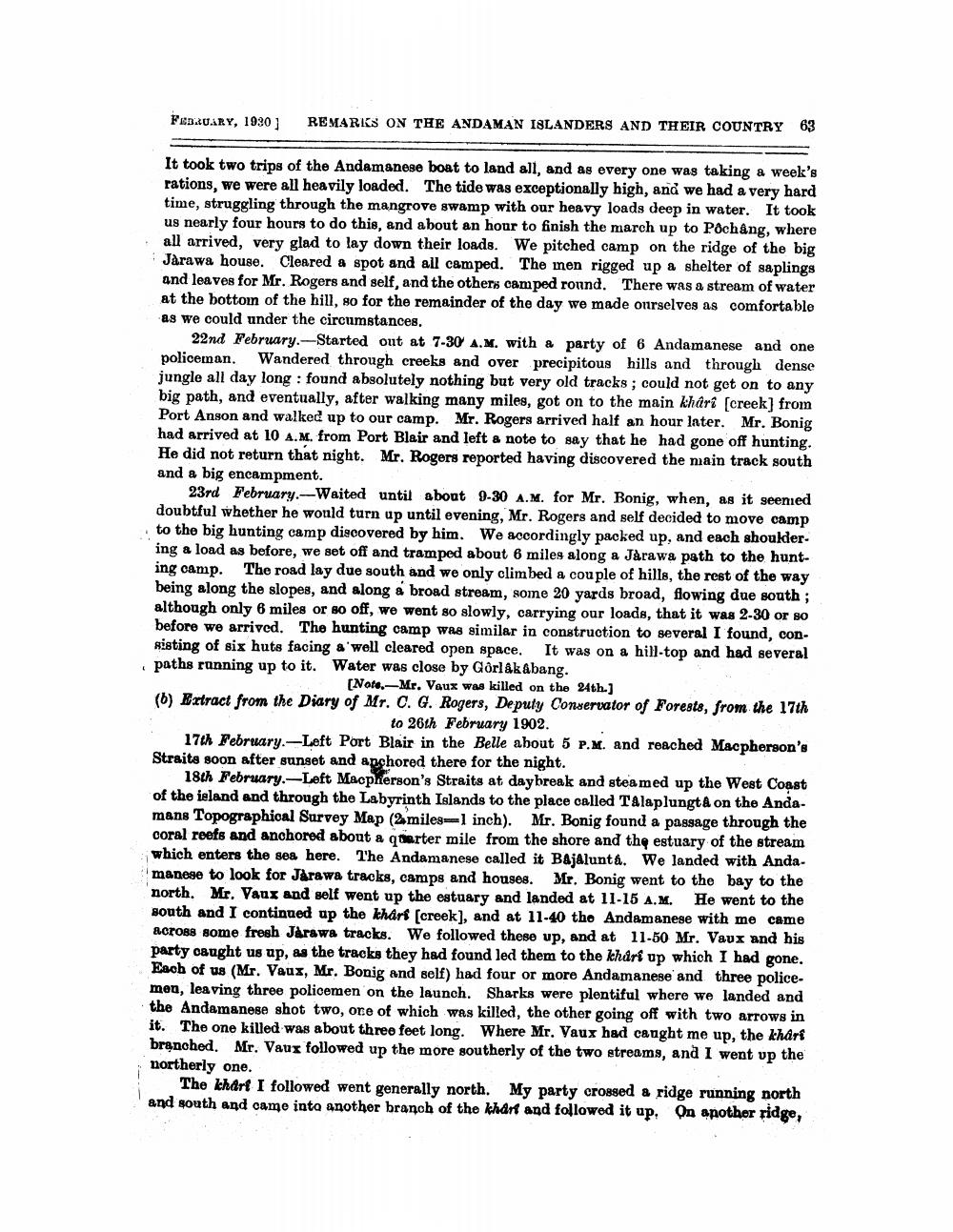________________
FEBZUARY, 1930]
REMARKS ON THE ANDAMAN ISLANDERS AND THEIR COUNTRY 63
It took two trips of the Andamanege boat to land all, and as every one was taking a week's rations, we were all heavily loaded. The tide was exceptionally high, and we had a very hard time, struggling through the mangrove swamp with our heavy loads deep in water. It took us nearly four hours to do this, and about an hour to finish the march up to Pôchång, where all arrived, very glad to lay down their loads. We pitched camp on the ridge of the big Jarawa house. Cleared a spot and all camped. The men rigged up a shelter of saplings and leaves for Mr. Rogers and self, and the others camped round. There was a stream of water at the bottom of the hill, 90 for the remainder of the day we made ourselves as comfortable as we could under the circumstances.
22nd February. Started out at 7-30 A.m. with a party of 6 Andamanese and one policeman. Wandered through creeks and over precipitous hills and through dense jungle all day long : found absolutely nothing but very old tracks; could not get on to any big path, and eventually, after walking many miles, got on to the main khâri (creek] from Port Anson and walked up to our camp. Mr. Rogers arrived half an hour later. Mr. Bonig had arrived at 10 A.M. from Port Blair and left & note to say that he had gone off hunting. He did not return that night. Mr. Rogers reported having discovered the main track south and a big encampment.
23rd February.--Waited until about 9-30 A.M. for Mr. Bonig, when, as it seenied doubtful whether he wonld turn up until evening, Mr. Rogers and self decided to move camp to the big hunting camp discovered by him. We accordingly packed up, and each shouldering a load as before, we set off and tramped about 6 miles along a Járawa path to the hunting camp. The road lay due south and we only climbed a couple of hills, the rest of the way being along the slopes, and along a broad stream, some 20 yards broad, flowing due south; although only 6 miles or so off, we went so slowly, carrying our loads, that it was 2-30 or so before we arrived. The hunting camp was similar in construction to several I found, consisting of six huts facing a'well cleared open space. It was on a hill top and had several paths running up to it. Water was close by GörlAk abang.
[Note.-Mr. Vaux was killed on the 24th.) (6) Extract from the Diary of Mr. C. G. Rogers, Deputy Conservator of Forests, from the 17th
to 26th February 1902. 17th February.-Left Port Blair in the Belle about 5 P.M. and reached Macpherson's Straits soon after sunset and anchored there for the night.
18th February.--Left Macpherson's Straits at day break and steamed up the West Coast of the island and through the Labyrinth Islands to the place called Talaplungta on the Andamans Topographical Survey Map (2 miles-l inch). Mr. Bonig found a passage through the coral reefs and anchored about a quarter mile from the shore and the estuary of the stream which enters the sea here. The Andamanese called it Bajálunta. We landed with Anda. manese to look for Jarawa tracks, camps and houses. Mr. Bonig went to the bay to the north. Mr. Vaux and self went up the estuary and landed at 11-15 A.M. He went to the south and I continued up the khart fcreek], and at 11-40 tho Andamanese with me came across some fresh Járawa tracks. We followed these up, and at 11-50 Mr. Vaux and his party caught us up, as the tracks they had found led them to the kharf up which I had gone. Each of us (Mr. Vaux, Mr. Bonig and self) had four or more Andamanese and three policemon, leaving three policemen on the launch. Sharks were plentiful where we landed and the Andamanese shot two, ore of which was killed, the other going off with two arrows in it. The one killed was about three feet long. Where Mr. Vaux had canght me up, the kharf branched. Mr. Vaux followed up the more southerly of the two streams, and I went vp the northerly one.
The khart I followed went generally north. My party crossed a ridge running north and south and came into another branch of the khart and followed it up. On another ridge,




